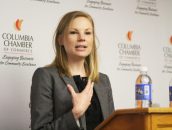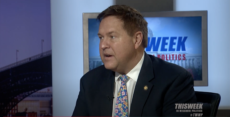JEFFERSON CITY, Mo. – On December 8, 2016, Article VIII, section 23 of the Missouri constitution went into effect, limiting campaign contributions to candidates seeking statewide office.
Since then, Missouri Ethics Commission (MEC) Director James Klahr says things at the MEC have been busy as filers and donors across the state have wanted to learn more about the intricacies of the constitutional amendment and what it may mean for their own campaigns, or campaigns they support.
“We consider our role to be a resource for filers and for committees,” he said. “It’s certainly within our regular role to try to handle these issues, but it’s certainly been busy for the last three months, almost four months now, since the effective date of Amendment 2.”
Amendment 2, as it was known on the ballot, was a significant change in the state’s campaign finance rules and laws, namely because it instituted campaign contribution limits to $2,600 from individuals. Before that became law, Missouri allowed unlimited campaign contribution limits, which starkly divided legislators.
The vote, however, proved anything but divisive. It passed with almost 70 percent of the vote, a margin representing over 1 million more people statewide.
However, Klahr and the MEC have constantly had to answer major questions about the law. In their latest newsletter, they answer some of the basics. No, the campaign contribution limit does not apply to local elections. Yes, there are still provisions of Amendment 2 that pertain to local elections, such as candidate committees not being allowed to donate to other campaign committees. Yes, candidate committees can still donate to political party PACs.
The yeoman’s work so far has occurred within the office. The MEC updated their website with a “Contribution Limits and Prohibitions” bar that specifically pertains to changes Amendment 2 actually made. That links to a 37-page document filled with frequently asked questions but also 10 advisory opinions they issued following the passage of Amendment 2.
 Loading...
Loading...
Not only that, but Klahr estimates Liz Ziegler, the general counsel for the MEC, has personally answered hundreds of questions regarding the change in the last month.
“We’re getting to a point where specific things are still being asked, but generally some of the big questions we’ve done already,” he said, adding that he is pleased with how well the MEC has handled the undertaking. “I think we’ve done a fairly good job of getting the word out.”
“Obviously with thousands of committees you’re not going to reach everyone right away, but I think people through word of mouth and hopefully through contacting our office have a pretty good feel for what the requirements of the new constitutional amendment are at this point.”
The only elections with major money at play so far, Klahr says, have been the municipal elections in St. Louis, which included the Democratic primary for a new mayor, so Klahr notes it’s difficult to see the full effects of their work. All of that work could be rendered at least partially moot, however, depending on the outcome of a lawsuit against Amendment 2 and its primary goal of limiting campaign contribution limits.
Klahr expects a decision from the federal court in the next month or two, but until then, his office will maintain their course in educating filers about the new law.
“We look forward to continuing to work with the filers to make sure they know what the new rules are so we can make sure folks are complying with Chapter 130 and Amendment II,” he said.








